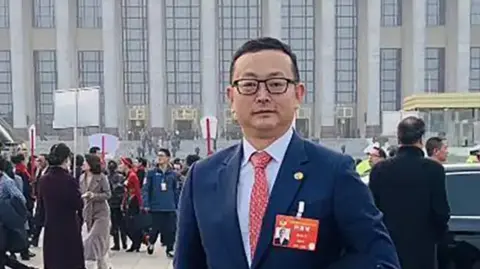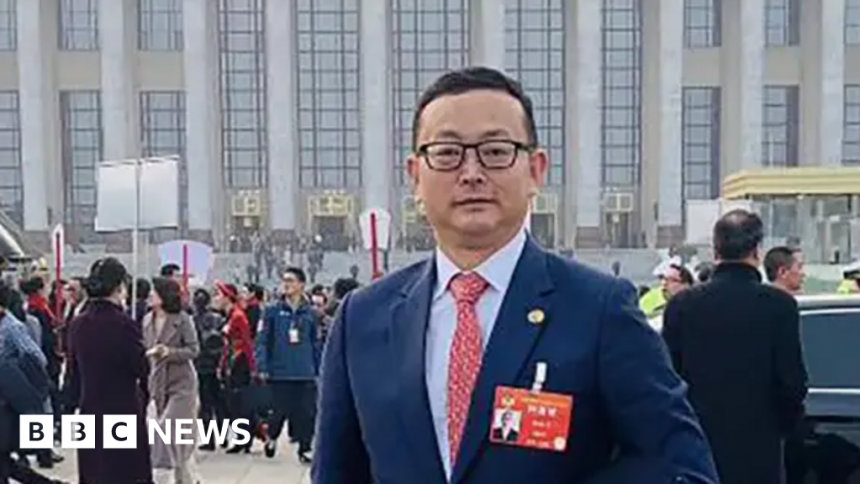Yang Tengbo: Who is alleged Chinese spy linked to Prince Andrew?
 Supplied
SuppliedYang Tengbo, also known as Chris Yang, is the 50-year-old Chinese businessman with links to Prince Andrew banned from the UK last year because he was judged as a risk to national security.
UK authorities have alleged he is a Chinese spy who formed an “unusual degree of trust” with the Duke of York and built relationships with politicians. Prince Andrew said he had “ceased all contact” with Yang and that “nothing of a sensitive nature” was discussed.
He was previously referred to as H6 but a court order concealing his identity was lifted on Monday. Yang has said he is not a spy and the media reports of him as such are “entirely untrue”.
“Due to the high level of speculation and misreporting in the media and elsewhere, I have asked my legal team to disclose my identity,” a statement read. “I have done nothing wrong or unlawful and the concerns raised by the Home Office against me are ill-founded.”
Yang – who had spent more than 20 years in the UK and held residence rights – appealed against the government’s decision to ban him from the country last year arguing his sudden exclusion was unlawful and unfair.
A Special Immigration Appeals Tribunal upheld the ban, saying in its published ruling last week that there was sufficient evidence to suggest he was a risk to national security. There are several details known about him from that case.
What do we know about Yang’s life and work?
Yang was born in China in 1974, where he studied at university and then worked as a junior civil servant for some years.
In 2002, he came to the UK where he studied language in London for one year and then took a masters degree in public policy at the University of York.
He told the tribunal he had originally intended to return to China to continue his career in the public sector, but saw opportunities for bridging the gap between China and the UK.
In 2005 he founded a company which provided travel and tourism services. That company, Hampton Group International. Yang remains listed as director of the company.
On 21 May 2013 he was granted indefinite leave to remain in the UK. He told the tribunal he has since divided life pretty evenly between the UK and China, and prior to the Covid pandemic had on average spent up to two weeks in the UK each month.
He considered the UK to be his “second home”, he told the tribunal.
What action have UK authorities taken?
On 6 November 2021, Yang was stopped at the UK border under counter-terrorism laws for undisclosed reasons. He was required to surrender his phone and other digital devices.
In February 2022, he filed a legal claim to stop the UK government from retaining his data – a bid he first won and then lost on appeal.
During that legal battle he was informed for the first time that UK authorities believed he was associated with the United Front Work Department (UFWD) – the secretive arm of the Chinese government that organises its cultural influence operations overseas and has been linked to several cases of alleged Chinese state interference overseas.
In mid-February 2023, Yang was “off-boarded” from a flight to London as he was returning from Beijing. He was told then UK authorities were in the process of making a decision to bar him from the country.
Yang’s lawyers on 9 March 2023 asked the government to disclose the reasons and allegations for this move, and the opportunity to make his case prior to any decision being made.
Six days later, then Home Secretary Suella Braverman ordered the cancellation of Yang’s residency rights and banned him from the UK on the basis it would be “conducive to the public good”.
Yang was informed of this decision in a letter on 23 March 2023. In April, he launched a case challenging the ban on the basis the decision was unlawful and procedurally unfair.
What was the evidence against Yang?
Authorities have relied on the data taken from Yang’s digital devices at the border stop in 2021.
It included documents which UK authorities said indicated a link between Yang, the UFWD and other Beijing-linked groups.
UK authorities argued Yang had “sometimes deliberately obscured” his links to the Chinese government, the Chinese Communist Party and the UFWD.
The Home Office said letters and documents found in his possession suggested he was “frequently connected to officials connected with the Chinese state” and alleged there was a “deceptive element” to how he had presented his links.
They also said Yang had honorary membership of the 48 Group Club – a London-based group aimed at promoting trade between the UK and China. The 70-year-old group has counted former Prime Minister Tony Blair and other senior UK politicians.
Security officials argued that Yang’s membership of the club, “which has a number of prominent UK figures as members”, could be leveraged for political interference purposes by China.
In a response to the US-funded Radio Free Asia media group on the weekend, the 48 Group Club said Yang was never actively involved the running of the group.
The tribunal judges said some of the evidence may have had an “innocent explanation” but said there was “sufficient” material to justify MI5’s conclusion Yang posed a national security risk, despite saying it had been a “finely balanced” decision.
What is Yang’s link to Prince Andrew?
Those documents showed Yang had received a letter from a senior adviser to Prince Andrew, Dominic Hampshire, who had confirmed to Yang he could act on behalf of the prince in engagements with potential partners and investors in China.
Mr Hampshire also told Yang in a letter: “Outside of [the prince’s] closest internal confidants, you sit at the very top of a tree that many, many people would like to be on.”
It is unclear if this was a true assertion put forward by Mr Hampshire, who has not spoken publicly since being named in the ruling.
But the Home Office assessed this as evidence that Yang was in a position to “generate relationships between prominent UK figures and senior Chinese officials” which “could be leveraged for political interference purposes” by Beijing.
A document listing “main talking points” for a call with Prince Andrew was also found.
It stated: “IMPORTANT: Manage expectations. Really important to not set ‘too high’ expectations – he is in a desperate situation and will grab onto anything.”
Judges also argued that Yang had “downplayed” his links with the UFWD, which they said “combined with his relationship with the Duke represented a threat to national security”.
Prince Andrew said he “ceased all contact” with Yang after receiving advice from the government, but did not specify when communication stopped.
In a statement, his office said the prince had met Yang “through official channels” and there was “nothing of a sensitive nature ever discussed”.
What has Yang said?
Yang has strongly denied the allegations against him. In his first submission to the tribunal appealing against his ban, he said he had avoided getting involved in politics and had no connections to anyone in politics in China.
In further submissions, he said he only had limited links to the Chinese State and that “contact with the UFWD is unavoidable”.
Yang said he had never been a member of the Chinese Communist Party and had never carried out activities on its behalf for for the UFWD. He said the ban was damaging to his personal life and business.
China’s embassy in the UK has denied the espionage claim, saying “some individuals in the UK are always eager to fabricate baseless ‘spy’ stories targeting China”.
“Their purpose is to smear China and disrupt normal exchanges between Chinese and British personnel,” a spokesperson for the embassy said on Friday.








